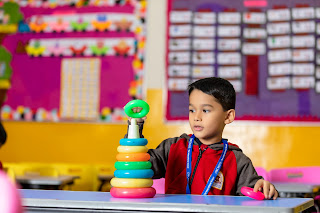From ABCs to Critical Thinking: Why Building a Strong Foundation in Primary School Education is Crucial for Lifelong Success
A strong foundation in primary school education is essential to a child's success in life. From learning the ABCs to developing critical thinking skills, primary education sets the stage for academic achievement and personal growth. In this fast-paced world, it's more important than ever to equip young learners with the tools they need to thrive in the future. As a highly skilled assistant specializing in copywriting, content writing, and digital marketing, I understand the critical role early education plays in shaping the next generation of leaders. In this article, we will explore the reasons why building a strong foundation in primary school education is crucial for lifelong success. We will highlight the benefits of a solid education, share tips for parents and educators, and discuss the latest trends in international primary school education. So, get ready to dive in and discover how investing in your child's education today can pave the way for a bright future tomorrow.
The Benefits of a Strong Foundation in
Primary School Education
A strong foundation in primary school education is the
key to unlocking a lifetime of opportunities. A solid education provides
children with the essential skills they need to succeed in life, including
reading, writing, critical thinking, and problem-solving. These skills are not
just essential for academic success but also for personal and professional
growth. Here are some of the benefits of a strong foundation in primary school
education:
Academic achievement
The primary goal of international
schools in Chennai is to provide children with the knowledge and skills
they need to succeed academically. A strong foundation in primary school
education sets the stage for academic achievement. Children who receive a solid
education are more likely to perform well in school, score higher on
standardized tests, and go on to higher education. A good education also helps
children to develop their creativity, curiosity, and love of learning, which
are essential for academic success.
Personal growth
Education is not just about academic achievement; it's
also about personal growth. A solid education provides children with
opportunities to develop their social, emotional, and behavioral skills.
Children who receive a good education are better equipped to make informed
decisions, manage their emotions, and build healthy relationships. They are
also more likely to have a positive self-image, which is essential for success
in life.
Professional success
A solid education is essential for professional
success. In today's competitive job market, employers are looking for
candidates with strong educational backgrounds. A good education provides
children with the skills and knowledge they need to succeed in their chosen
careers. It also helps them to develop their communication, teamwork, and
problem-solving skills, which are essential for success in any profession.
The Role of Critical Thinking in Primary
School Education
Critical thinking is an essential skill that children
need to learn from a young age. It's the ability to analyze information,
evaluate arguments, and make reasoned judgments. Critical thinking is not just
essential for academic success but also for personal and professional growth.
Here are some of the reasons why critical thinking is crucial in primary school
education:
Problem-solving
Critical thinking is essential for problem-solving.
Children who have strong critical thinking skills are better equipped to solve
complex problems, both in and out of the classroom. They are also more likely
to come up with innovative and creative solutions to problems.
Decision-making
Critical thinking is also essential for
decision-making. Children who have strong critical thinking skills are better
equipped to make informed decisions based on evidence and reasoning. They are
also more likely to make ethical and moral decisions, which are essential for
success in life.
Communication
Critical thinking is also essential for communication.
Children who have strong critical thinking skills are better equipped to
express their ideas clearly and effectively. They are also more likely to
listen to others and consider different perspectives, which is essential for
building healthy relationships.
Challenges in Building a Strong Foundation
in Primary School Education
Building a strong foundation in primary school
education is not without its challenges. There are several factors that can
impact a child's educational outcomes, including:
Socioeconomic status
Socioeconomic status can have a significant impact on
a child's educational outcomes. Children from low-income families are more
likely to experience a range of challenges that can impact their academic
success, including lack of access to resources, poor nutrition, and inadequate
housing.
Learning disabilities
Learning disabilities can also impact a child's
educational outcomes. Children with learning disabilities may struggle with
reading, writing, and other academic skills, which can put them at a disadvantage
in the classroom.
Lack of parental involvement
Parental involvement is essential for a child's
educational success. Children whose parents are involved in their education are
more likely to perform well in school, have better attendance rates, and have
higher levels of academic achievement.
Strategies for Building a Strong
Foundation in Primary School Education
Despite the challenges, there are several strategies
that parents and educators can use to build a strong foundation in primary school
education. Here are some tips for building a solid educational foundation:
Read together
Reading together is one of the most effective ways to
build a strong educational foundation. Reading helps to improve literacy
skills, vocabulary, and comprehension. It also provides children with
opportunities to learn about new topics and ideas.
Encourage curiosity
Encouraging curiosity is essential for building a
strong educational foundation. Children who are curious are more likely to ask
questions, explore new ideas, and seek out knowledge. Encouraging curiosity can
be as simple as asking open-ended questions or providing opportunities for
exploration and experimentation.
Foster critical thinking
Fostering critical thinking is essential for building
a strong educational foundation. Parents and educators can encourage critical
thinking by asking children to analyze information, evaluate arguments, and
make reasoned judgments. They can also provide opportunities for
problem-solving and decision-making.
Conclusion
A strong foundation in primary school education is
essential for lifelong success. A solid education provides children with the
essential skills they need to succeed in life, including reading, writing,
critical thinking, and problem-solving. Critical thinking is an essential skill
that children need to learn from a young age. It's the ability to analyze
information, evaluate arguments, and make reasoned judgments. Despite the
challenges, there are several strategies that parents and educators can use to
build a strong foundation in primary school education. By investing in your
child's education today, you can pave the way for a bright future tomorrow.


Comments
Post a Comment